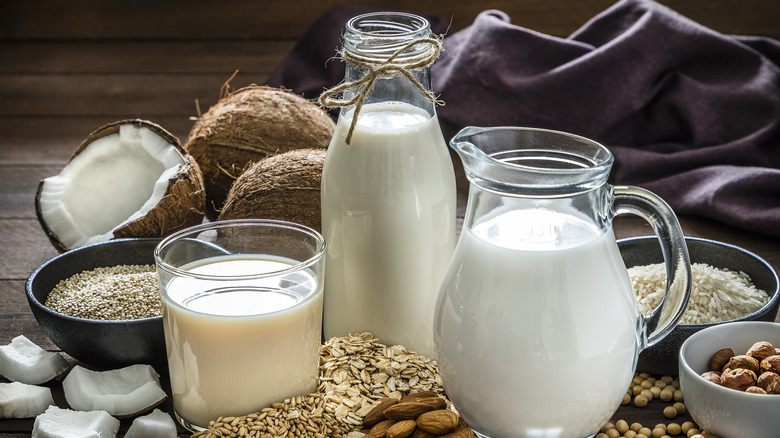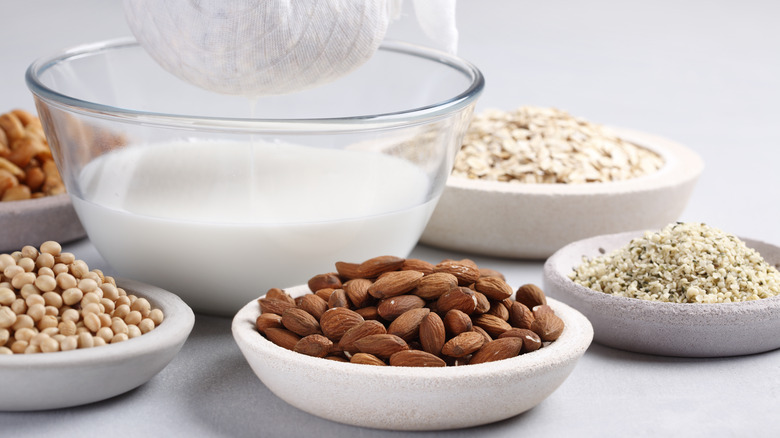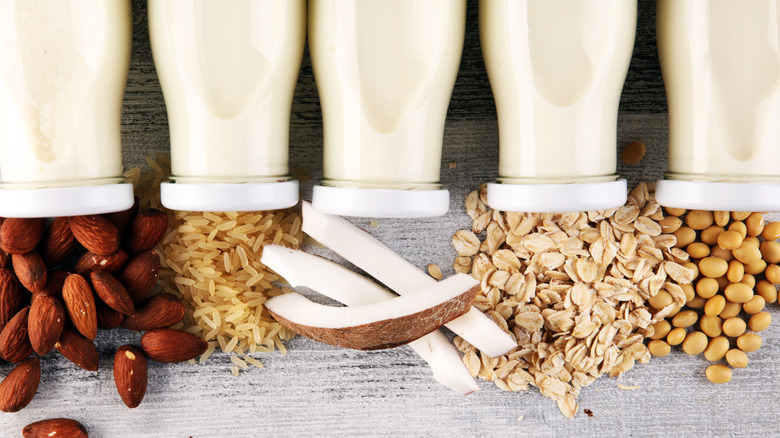Which Non-Dairy Milk Is Best For Baking?
Whether it's due to allergies, environmental concerns, or just a general pursuit of better health, there are always many motivators to incorporate more plant-based dairy alternatives like nut milks into everyday life. The problem is, traditional milk is an incredibly versatile ingredient that performs important functions in a variety of cooking applications — not the least of which is baking, where it's called for in a vast majority of recipes. Frequent bakers might find themselves asking which non-dairy substitute is best at filling the role of milk for preparing breads, pastries, and other baked goods.
The short answer: Soy and/or cashew milk reign supreme. If you're just looking for the closest substitute to prepare a boxed cake mix or a simple baking project, you won't need to look further than a carton of unflavored soy or cashew milk since both are scientifically the closest to dairy milk. But nutritional similarity isn't everything, and different recipes will rely on different aspects of milk to come out just right — not to mention the distinct flavors that every dairy substitute brings with it. So, the long answer to what plant-based milk is best for baking really comes down to proteins, fats, and most crucially, personal taste.
What plant-based milk is scientifically the best swap?
While the primary role of milk in baking recipes is to add moisture to the mix, the reason we use it instead of water is because of the richer taste and more robust texture that come courtesy of the protein and fat present in milk. Protein adds structure to the batter while fat adds a creamy richness to the entire mixture.
According to the USDA's nutritional breakdown, soy, almond, rice, oat, cashew, and coconut milks all have less protein per serving than the average dairy whole milk, which has 3.28 grams protein per 100 gram serving size. Soy milk comes closest in protein content with 2.6 grams per 100 grams serving size, followed by cashew milk at 2.2 grams. Both options win by a landslide over the 0.21 grams of protein present in coconut milk, 0.66 grams in almond milk, and 0.8 grams in oat milk. Cashew milk, on the other hand, has 5.29 grams of fat per 100 grams serving size, which is actually more than the 3.2 grams of protein found in whole milk.
Fat content is another important factor. Whole dairy milk has 1.47 grams in the same serving size mentioned above, whereas coconut milk has 2.08 grams of fat and oat milk has 2.75 grams of fat.
In terms of baking chemistry alone, cashew milk seems to be the closest to dairy milk, followed by the more affordable and commonly available soy milk.
Other keys to picking non-dairy substitutes for baking
So if soy and cashew milk are scientifically the closest to dairy milk, why is there so much debate as to which non-dairy milk is best for baking? What might seem like a clear-cut answer is complicated by the fact that each kind of milk — including traditional dairy — comes with a unique flavor profile that can't be replicated by anything else.
This uniqueness translates differently in various recipes and appeals to different palates in unpredictable ways. For some, the distinctly bean-like taste and lower fat content of soy milk doesn't quite live up to their expectations in sweeter or more decadent recipes. Others find the fattier and sweeter oat milk vastly superior to other plant-based milks when making muffins, whereas others may advise against oat milk and recommend coconut milk instead for substituting whole milk or cream in baking.
While cashew milk might seem like the obvious solution to the protein and fat problem, it sees less use in baking overall due to its niche status and subsequent lack of availability in many cases. Despite having concrete nutritional information to compare the different milks, it seems the question of what is the "best" milk for baking comes down largely to individual circumstances like the kind of recipe, availability of the plant-based products, any possible nut and/or soy allergies, as well as simple taste preference.


